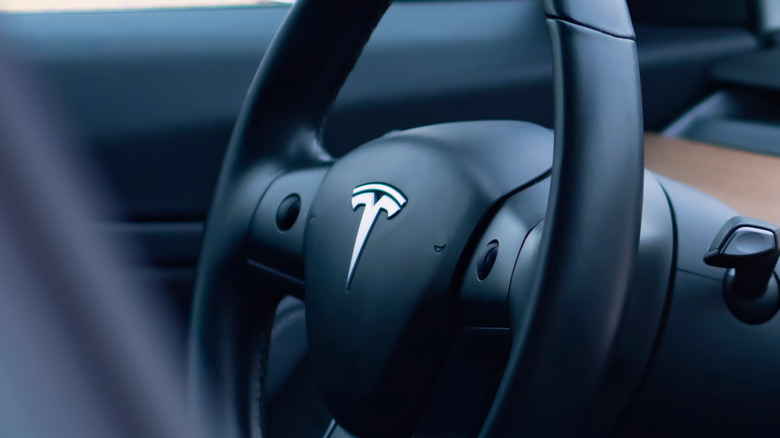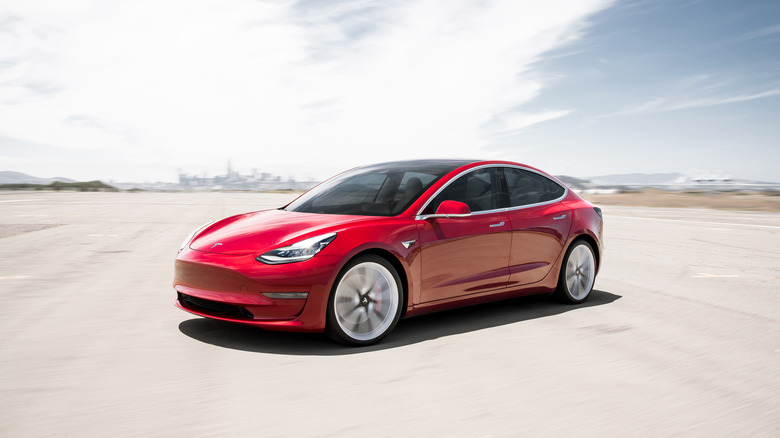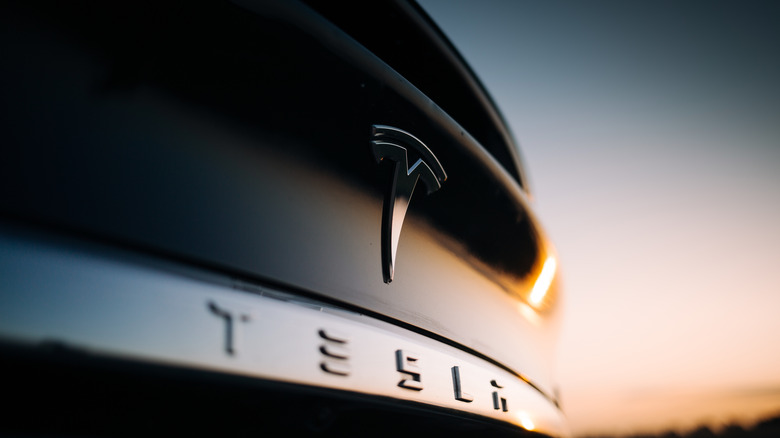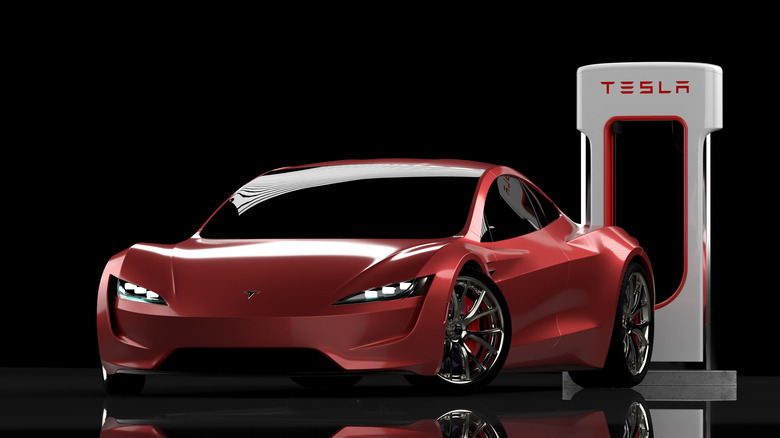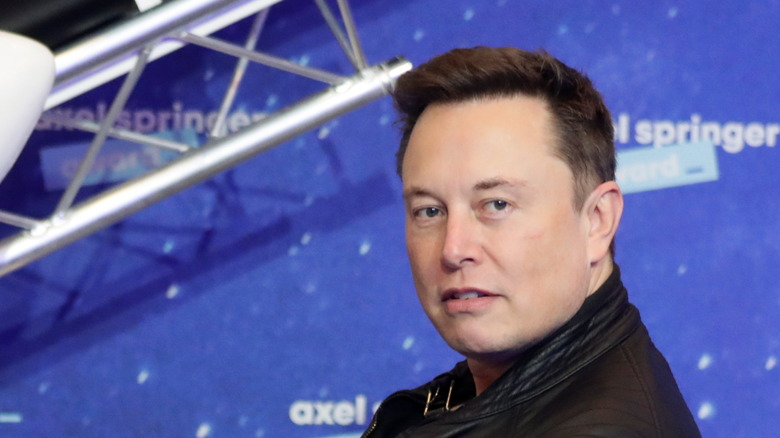A Brief History Of Tesla's Biggest Recalls
Elon Musk's world-leading electric vehicle manufacturer Tesla has hit the headlines after recalling hundreds of thousands of its vehicles. The recall centers around one of Tesla's most famous and controversial features: Full Self-Driving. The feature has been hyped up and promised for years, but is still not at the full release stage. Full Self-Driving did take what should have been a massive leap forward late last year when a beta version of the feature was made available for certain customers. Unfortunately, so far that seems to be where the real problems have started.
If you've ever encountered the beta version of a video game, you'll be aware that they are usually still laden with bugs and far less stable than the full game will eventually be. It's the same with Tesla, but on a different scale. While a video game crashing can be quite annoying, a Tesla crashing because of a beta-related quirk is obviously far more serious. While this recent recall is indeed major, it is far from the first Tesla has issued and is very unlikely to be the last. Tesla has had its share of recalls over the years, and some even eclipsed the one issued earlier today, which sees up to 360,000 vehicles affected.
Tesla hasn't had too many recalls
While there have been many Tesla recalls over the years, many of them are quite easily solved. This latest recall is very serious, as lives may be at risk, at least according to both the National Highway Traffic and Safety Administration (NHTSA) and anyone who has been keeping track of the accidents modern driver-assisted vehicles have caused. But it is an easy fix, at least from the customer's point of view. If you're a Tesla customer who has been affected by this recall, you won't have to visit a dealership, have your car taken away by a tow truck, or part with any cash. An over-the-air update that allegedly fixes the issues will be rolling out in the coming months, and you just need to install that as you would any other update to fix the issue.
Others are more minor but still have potential consequences. Cars.com lists 47 different recalls of Tesla vehicles since 2009. That's not particularly outlandish — if anything it's pretty low. Statistics from the Department of Transportation show that Ford, Chrysler, and Mercedes-Benz have all had close to 10 times as many recalls over a similar time period — though those companies do produce a far wider range of vehicles with more that could potentially go wrong.
Of Tesla's 47 recalls, most of them sound like minor things with potentially bad consequences. Issues that may affect airbags are common, some parts can't stand up to potholes, and others are the result of the car not being built properly. There are also plenty of software-related and feature-related recalls, which include the most recent one, and another major problem from a couple of years ago.
The number of Tesla EVs recalled number in the millions
Tesla's most recent recall is certainly major — 360,000 vehicles is a lot, working out at about a quarter of the company's average annual output at the time of writing. But it has been outpointed by other recalls, one of which numbered over 1 million. Like the most recent mishap, the recall that went out to 1.1 million Tesla customers had a pretty easy fix: they just had to wait around for Tesla to patch a software issue and make sure their vehicle installed it. If the customer in question had configured their car to update automatically, and the car had an internet connection, they wouldn't actually have to do anything else. The problem would just resolve itself.
The recall was also over something far more minor than the current one. While the Full Self-Driving recall is fixing an issue that could allegedly cause death or serious injury, Tesla's million-vehicle recall probably saved a few sore fingers at best. The problem was related to the electric windows in the 2017 to 2022 Model 3, 2020 and 2021 Model Y, 2021 and 2022 Model S, and 2021 and 2022 Model X EVs.
The windows weren't correctly detecting obstructions when closing, so there was a danger of a body part being caught in one. The recall was issued in September 2022 and the patch has long since rolled out. If you think sore fingers are a bit minor, you should see how the company had to deal with its external speaker system.
Some of the recalls may seem a touch trivial
While there have been many Tesla recalls over the years, the majority of them have been trivial and many of them are quite easily solved. Toward the end of 2021, the company had to contact the owners of close to half a million of its vehicles. The recall in question was related to an unnecessary feature that probably sounds cool on paper but actually affected a vital safety tool. Tesla's "boombox" feature may sound utterly obnoxious but is harmless on the face of it. Most drivers are content listening to music inside their own cars and have to take a bit of eardrum damage to make said music carry beyond the interior.
Boombox uses an external speaker that allows you to subject innocent civilians to your horrific musical tastes without damaging your own eardrums. Luckily, Tesla had to take boombox back to the drawing board when it turned out the noise emitted by the speaker affected the function of another speaker that is legally required to play a noise warning pedestrians of the approaching vehicle.
The ruling resulted in one of Tesla's most wide-ranging recalls. You may think it was a self-correcting problem as the sounds emitted by the boombox speaker would draw as much, if not more attention than the pedestrian speaker does. You may also have a case. Tesla's owner and CEO also thinks some of the recalls are trivial and has even suggested changing how some of them are categorized.
Musk doesn't like recalls
Elon Musk has previously spoken out about some of Tesla's more trivial-sounding recalls. The controversial billionaire isn't saying the issues don't have to be flagged and fixed, but is instead worried about what the word recall may imply. When referencing the issue that saw 1.1 million Teslas recalled due to an issue with the automatic windows, Musk described the terminology as "outdated and inaccurate."
The terminology is outdated & inaccurate. This is a tiny over-the-air software update. To the best of our knowledge, there have been no injuries.
— Elon Musk (@elonmusk) September 22, 2022
The billionaire described the fix as "a tiny over-the-air software update" and implied there had been no reported injuries caused by the issue. Musk may actually have a point. The word recall does conjure up certain images, none of which involve a car simply installing an update that its owner may not even notice. However, the word recall and the weight it carries also causes people to pay attention, and makes news spread.
The current recall Tesla is issuing is also going to be fixed via an over-the-air update. Affected drivers may not even notice there is a problem, or that the fix has even happened. But, the issue is described as very serious and could allegedly lead to death or serious injury. The fix itself is also rolling out over a period of weeks. It is important that drivers who may be using the faulty feature between the time the recall notice is issued and when the fix is implemented are informed of the problem. That way, they can be aware of the potential risks involved and take appropriate action. Downplaying the issue — or rebranding it as something less impactful — could lead to fewer people hearing about it. And ultimately, Tesla's customers shouldn't be left in the dark and placed in danger so its owner doesn't have to read words he doesn't like.
